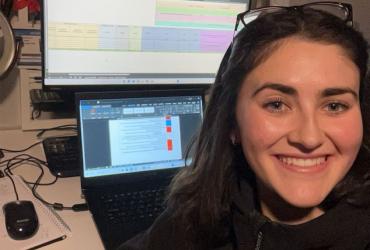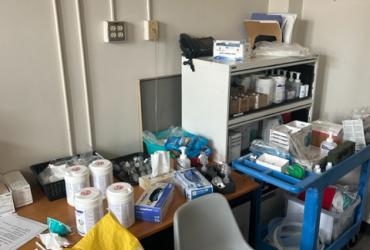Orientation and First Weeks
The first few days you are thrown a ton of information in an overview of the job. There will be paperwork to fill out, PowerPoints to go through, and learning the names and locations of the fields you will be monitoring. You will learn about what role you play on the team and what will be expected of you, as well as what sort of things you need to be looking for in the fields. This includes types of pests, diseases, different types of feeding damage on the crops, and more. Lots of the gear required is given to you on the first day, including a scout pack, vials for sampling, data sheets, and other gear needed for monitoring. Meeting the team was also an important part of the first few weeks, since you are constantly changing the partners you work with every day. There were lots of ice breakers and team building exercises done to ensure everyone is comfortable working with everyone else. One way that we bonded as a team as well as got a feel for the locations we would be working in was with a scavenger hunt. In teams we would drive around looking for items and learning about what landmarks are used to access the fields.
As the first few weeks go by you start to get the hang of things and move into a routine, so it does get easier as you get better. Being efficient in monitoring is a key aspect of the job to ensure you can visit as many fields as possible each day. However, in the first few weeks the team really emphasizes taking your time and understanding what you're seeing in the fields.
Day to Day
What a normal day usually looks like is getting paired up with one of the other scouts and getting your field list for the day. The list can vary from 5-10 fields a day, depending on what period of the season you are in. Once everyone breaks off into their pairings they go to their required fields to monitor. We track our findings on data sheets and collect samples from the fields when needed. Once we are done for the day we report back to the field office to hand in our completed data sheets and any samples from the day.
Learning and Adaptation
Prior to this co-op, I had very flexible hours where I was able to determine my start and end time since I mostly monitored solo. For this work term, the hours are very structured seeing that you were working with a team and needed everyone to end around the same time. Learning about farm life was a bit of a new idea for me also, considering I had never worked on a farm before. Lots of the growers are working alongside you as you're monitoring, either getting ready to irrigate the field, re-hilling the rows of potatoes, or even harvesting so being aware of your surroundings at all times is quite important. Adapting to this style of work took some getting used to, but after about a month or so of repetition it becomes very natural.
Learning about all the different insects and diseases that you may come in contact with in the field was definitely a learning curve, especially since some of them can look very similar at certain stages in their life cycle. There will be some pests that you are consistently seeing so they can become second nature to you, but taking lots of photos/samples and asking questions (even when you think you know the answer) is the best way to learn.
Accomplishments and Challenges
The biggest challenge I'd say was the weather conditions. Since this is a summer job, some of the days can get very hot when you're out in the fields. Bringing lots of water and staying protected from the sun as much as possible is the most important thing when working a physically demanding job like this. Luckily our supervisors know what it's like to be working as a scout, so they were able to shift things around on the really hot days. For example, starting earlier in the mornings to try and avoid the hot afternoon sun. They would also encourage us to take a couple extra minutes to cool off either in the shade or in our cars after a field, and to drink lots of electrolytes. Having supervisors that look out for you while in the fields was something that I greatly appreciated about working with E.S.
An accomplishment would be seeing the impact of what you're doing on the potato fields firsthand. Since the same fields are monitored every week, you are able to directly see how the data you collect can benefit the crops and allow them to flourish. Also, as the months go by seeing how much more efficient you are at monitoring. You notice more in the fields and are able to hit those goals of finishing 9 or 10 fields a day.















